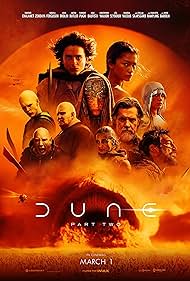It’s been a wait lasting just over two years, but it was all worth it.
The release of Dune: Part Two on March 1 was highly anticipated, especially after it was delayed from its original release date in Nov. of last year. On its release, it has proved to be a success for Hollywood, raking in $82.5 million domestically, and nearly $100 million internationally, on its opening weekend.
The film adapts the second half of Frank Herbert’s 1965 novel Dune, and manages to pull it off without many major deviations from the book, just like the first film in 2021.
The film has amazing visuals, making the desert of Arrakis both stunning and intimidating. Most of the film takes place on Arrakis, so the tan and orange hue of the sand and the air become commonplace. When not on Arrakis, the film mostly moves to Giedi Prime, the Harkonnen homeworld and a disgusting, polluted planet with a black sun that makes the outside monochrome.
The film also feels incredibly surreal, with many vision scenes and incredible feats of what can be described as “magic”; however, this is a great adaptation from the novel, as the novel tends to also be surreal, weird, and even a little bit insane. Director Denis Villeneuve captures this side of Dune very well.
In terms of its acting, Dune: Part Two pulls off the same greatness that the first film achieved, with each actor feeling incredibly natural in the role. Timothee Chalamet brilliantly conveys the complexity of Paul Atreides, the main protagonist of both films. Austin Butler convinces as Feyd-Rautha, the nephew of Baron Vladimir Harkonnen and Paul’s main rival at the end of the film.
One issue that some viewers might have is that the terminology of Dune is never really explained. Most film adaptations of the novel assume that the viewers have read the novel, Villeneuve’s adaptation included. Granted, a wave of interest in the series was created with the 2021 film, but for the greater amount of casual movie-watchers, the more complex worldbuilding of the series might seem harsh.
The film is also long, clocking in at two hours and forty-six minutes. Watching it is a time commitment, especially for the casual viewer.
The story that the film tells wonderfully finishes the adaptation of Herbert’s novel, and many fans of the series hope that Villeneuve will also adapt the second book in the series, Dune: Messiah. To his credit, Villeneuve has expressed interest in expanding the film universe he created with an adaptation of Messiah as the third, and final, part in his series.
Overall, the film is a treat for the eyes and ears. If you haven’t seen it yet, I encourage you to go out and watch it. The experience is well worth it.






